A patient has been prescribed 75 milligrams (mg) of Tramadol each day. How many milligrams will the patient take each week?
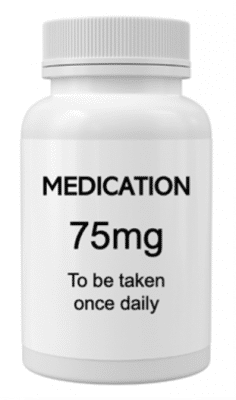
A. 375mg
B. 750mg
C. 525mg
D. 252mg

(300+ Sample Questions & Answers)
Trusted by 1000s of students worldwide:


The NHS is an outstanding organisation that has revolutionised public healthcare, and as a leading worldwide national health service, it sets high standards for those wishing to join the NHS. The NHS uses a variety of numerical, literacy tests and values throughout its selection process. That is why it is critical to understand the values (known as the NHS Values) and test questions they use, as you WILL BE ASSESSED against them during the selection process!
The NHS Values serve as a template for the role of all NHS Staff. To have a chance of success, applicants MUST learn, comprehend, and most crucially, be able to DEMONSTRATE them at EVERY stage of the selection process.
Scores are determined by how well each NHS Value is exhibited and proven, so be sure you know them completely and well ahead of time.
In addition to the NHS Values, you will also be assessed on medical calculations, speed of work, and attention to detail via numerical and literacy-based assessments.
NHS NUMERACY AND LITERACY ASSESSMENT TEST!
The NHS numeracy and literacy test is designed to assess a candidate’s suitability to carry out basic tasks that are relevant to the healthcare role they have applied for. Regardless of the job you are applying for within the NHS, you will need to be competent in basic numeracy and literacy skills.
For example, if you are a nurse or healthcare assistant in the NHS, you will have to carry out quick and accurate numeracy calculations when prescribing medication or check a patient’s blood pressure correctly. If you are an NHS clerk, health records staff, receptionist, secretary/typist, or medical secretary/personal assistant, you will have to quickly read, assess, and analyse written documents.
As you can imagine, working in the NHS, regardless of the healthcare role you occupy, speed and accuracy of working are vital and the NHS numeracy and literacy test assesses your competency in these areas.
The numeracy test element of the NHS assessment test includes basic mathematical calculations, including addition, multiplication, subtraction, and division. Some of the test questions will also require you to convert decimals to fractions, and also fractions to decimals.
The literacy test is different from the numeracy test in the fact that you will have to assess passages of written text and then answer questions that are often multiple-choice in nature. Both the NHS literacy and numeracy assessment tests are undertaken under timed conditions.
The role of key healthcare workers in the National Health Service is fundamental to the safety and wellbeing of patients. Therefore, medical calculations, speed of work, and attention to detail are vital components of all NHS healthcare job roles. If an NHS job applicant does not have the basic numeracy and literacy skills needed to carry out the role, it could potentially put patients and co-workers in danger.
For example, if a doctor, nurse, or healthcare worker is prescribing medication in their daily duties it is absolutely crucial the work they carry out is accurate. If it isn’t, the wrong medication or the wrong dose or quantity of medication could be administered. The NHS has a clear set of values that include a commitment to quality of care. NHS workers are trusted by patients to provide quality care that is safe, and effective every time.
In our experience, and having consulted several previous NHS applicants, the most effective way to prepare is to undertake numerous sample numeracy and literacy test questions under timed conditions. By practicing under timed conditions it enables you to improve your scores dramatically. When preparing for the NHS numeracy and literacy test, follow these 3 simple steps:
STEP 1: Obtain examples of NHS numeracy and literacy test questions. Read them and gain an understanding of the format. If you understand the style of questions you will have to answer, the real test will be less daunting.
STEP 2: Practice sample numeracy and literacy test questions regularly in the build-up to the real test. Little and often is far better than cramming the night before your test.
STEP 3: The most important step when preparing for your NHS assessment test is to make sure you practice the numeracy and literacy test questions under strict timed conditions. During the real test, you will undoubtedly be nervous. By practicing numerous multiple-choice example questions under tined conditions it helps to increase your speed of working and competency levels.
Below, are several examples of test questions that are designed to help you prepare for your real NHS numeracy and literacy assessment test. It does not matter if you are applying to become a nurse, a healthcare worker, a healthcare assistant, a doctor, an administrative worker, or a patient advisor, the following test questions are useful in your preparation. Look at the following questions and see how you get on:
A patient has been prescribed 75 milligrams (mg) of Tramadol each day. How many milligrams will the patient take each week?

A. 375mg
B. 750mg
C. 525mg
D. 252mg
ANSWER = C. 525mg
A patient has been prescribed the following medication. How many milligrams in total will the patient take in 10 days?
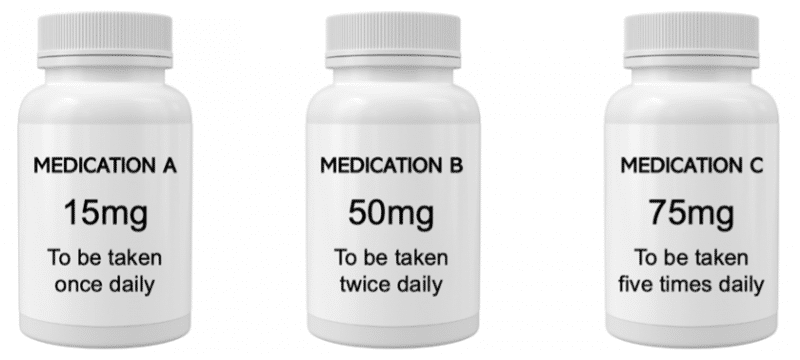
A. 5,050mg
B. 4,750mg
C. 4,900mg
D. 5,600mg
ANSWER = A. 4,900mg
Read the following information before answering the question.
Stacey leaves home at 07:40. It takes her 7 minutes to walk to the bus stop. Her bus her scheduled to leave at 07:50. The bus journey to work then takes 43 minutes. Stacey then walks 12 minutes from the bus stop to the hospital.
At what time does Stacey arrive at the hospital?
A. 08:32
B. 08:16
C. 08:42
D. 08:45
ANSWER = D. 08:45
Read the following information before answering the question.
Mohammad works at a GP surgery. He leaves home at 07:59. It takes him 8 minutes to walk to the bus stop. His bus leaves at 08:08 and the journey takes 37 minutes. Mohammad then walks 17 minutes from the bus stop to the GP surgery.
Mohammad is due to start work at 09:00. Will he be late for work?
A. Yes
B. No
ANSWER = A. Yes
Well done if you managed to get all of the NHS numeracy test questions correct. Now it’s time to try some NHS literacy test questions detailed below:
Below are details of Karen’s work diary. Karen works for the NHS as an admin officer. Which order does Karen do each task each day?
I get to work before switching on the computers in the office. I then check the post before switching on the kettle. I then check the answerphone messages after I have obtained a brief from my manager.
A. Computers; Kettle; Post; Answerphone Messages; Brief From Manager.
B. Post; Kettle; Computers; Brief From Manager; Answerphone Messages.
C. Computers; Post; Kettle; Brief From Manager; Answerphone Messages.
D. Computers; Post; Kettle; Answerphone Messages; Brief From Manager.
ANSWER = C. Computers; Post; Kettle; Brief From Manager; Answerphone Messages.
Below are details of Adeena’s work diary. Adeena works as an admin assistant for the NHS. Which order does Adeena do each task each day?
When I get to work I carry out a stocktake to ensure we have sufficient office supplies for the day. Once I have checked my emails, I have a team briefing. After I have had a tea break, I call several contractors before finishing for the day.
A. Stocktake; Team Briefing; Emails; Call Contractors; Tea Break.
B. Stocktake; Emails; Team Briefing; Tea Break; Call Contractors.
C. Stocktake; Emails; Tea Break; Team Briefing; Call Contractors.
D. Stocktake; Emails; Team Briefing; Call Contractors; Tea Break.
ANSWER = B. Stocktake; Emails; Team Briefing; Tea Break; Call Contractors.
Read the following passage before answering the question that follows.
The NHS is a formidable organisation that employs talented, hard-working, and committed staff who work tirelessly to provide a first-class service to everyone. It is the responsibility of all healthcare profesionals to ‘make every contact count’ when they deal with individuals and patients in their daily work. Healthcare staff in the NHS should, where possible, seek to maintain or improve people’s mental and physical wellbeing in all of their duties.
In the second sentence of the paragraph, the word profesionals is spelled incorrectly. Which of the following words is the correct spelling?
A. professionals
B. profesionnals
C. proffessionals
D. proffesionnals
ANSWER = A. professionals
Read the following information before answering the question.
Mohammad works at a GP surgery. He leaves home at 07:59. It takes him 8 minutes to walk to the bus stop. His bus leaves at 08:08 and the journey takes 37 minutes. Mohammad then walks 17 minutes from the bus stop to the GP surgery.
Mohammad is due to start work at 09:00. Will he be late for work?
A. Yes
B. No
ANSWER = A. Yes
As you can see, practicing numerous example NHS numeracy and literacy test questions enables you to increase your speed, accuracy, and competency in preparation for the real test! Get INSTANT ACCESS to more example test questions that are guaranteed to help you prepare fully for your NHS test below!
During the assessment process for joining the NHS, in addition to the numeracy and literacy test questions, you will be assessed against your knowledge, understanding, and application in the workplace of the NHS values. The NHS values are predominantly assessed during the interview stage of the selection process and it is our strong recommendation that you both learn and understand the values because they are crucial to patient safety and your ability to provide first-class care in your NHS duties.
All NHS staff, regardless of the duties, are required to demonstrate the NHS values in their daily work. There are six NHS values that apply to all workers, including consultants, nurses, doctors, administrative staff, hospital porters, healthcare assistants, dental assistants and surgeons, laboratory technicians, and secretaries. The six NHS values are as follows:
Patients must always come first in everything you do working in the NHS.
Working in the NHS means maximising resources to make sure they benefit everyone. It will be your duty to ensure no person is discriminated against, excluded, or left behind. Inclusive working is very much at the heart of the NHS.
Without respect and dignity, the NHS would not be able to provide outstanding service and care. Respect and dignity apply to everyone, including patients, their family and relatives, contractors, suppliers, and work colleagues.
Every contact you have with a patient in the NHS should be used to improve their health and wellbeing. Working in the NHS is not limited to assessment, treatment, and care, it is about advice and education, too.
The highest standards of care must be maintained at all times in your NHS duties. You must seek to improve, learn, provide the right quality and standards of care, and work to earn the trust that has been placed in you by the patients.
The NHS would not be the service it is today without compassion and empathy. NHS staff ensure that compassion, kindness, and understanding are central to everything they do.
To help you prepare for the NHS assessment process, including the tough NHS interviews, we have provided you with several NHS values workplace assessment test questions below. Give the questions a try and see if you can answer them correctly.
You are a receptionist at a local health centre. You are speaking on the phone to a colleague about arranging a staff meeting. A stressed patient enters the health centre reception area and they interrupt your phone conversation. What would you do?
A. Politely ask the patient to wait until you finish your call.
B. Avoid making eye contact with the patient and finish the call as quickly as possible so you can deal with the patient’s query.
C. Tell your colleague that you will have to call them back before dealing with the stressed patient.
D. Ask your colleague to hold while you get another colleague to deal with the patients’ query, then continue with your conversation.
Answer – C. This is the most effective response. By dealing with the patient, you are attending to their needs before your own tasks. This is a fundamental part of the NHS values.
You are a healthcare assistant working in a hospital ward for elderly patients. You are getting a bed ready for an incoming patient when you overhear raised voices. A patient is questioning the treatment they are receiving from a work colleague. What do you do?
A. Tell the patient that is not acceptable to speak to your colleague in such a way and ask them to calm down.
B. Listen to the patient’s concerns. Explain that all staff is here to help and that they will be treated with dignity and respect. Reassure the patient and answer carefully any questions they have.
C. Tell your colleague that you will deal with the patient. Explain confidently and robustly that they must have the treatment.
D. Tell your colleague not to treat the patient. If they don’t want the treatment, you can’t force them.
Answer – B. This is the only acceptable answer. This shows you are listening to the concerns of the patient, and reassuring them they will be treated with dignity and respect.
You are a ward manager carrying out your morning rounds when you notice two team members having a heated disagreement. The patients on the ward can hear the conversation. How do you approach this situation?
A. Discretely approach the team members and tell them to cease with their behaviour. Tell them both to continue with their duties.
B. Ignore the behaviour this time. Working in the NHS can be very stressful things will get heated at times. Monitor the situation to make sure it does not escalate.
C. Approach the team members and berate them in front of the patients. Tell them their actions are unacceptable. It is important to show the patients you are in charge and that this type of behaviour is not acceptable in the NHS.
D. Approach your colleagues and discretely tell them to stop their conversation. Arrange to speak to them both in private to ascertain the issue, and to resolve it. Tell them to continue with their duties.
Answer – D. This is the most suitable answer for the scenario. By discretely telling them to cease the discussion you are de-escalating the issue. By speaking to them in private you are attempting to thoroughly understand the problem and seek a resolution.
Now INSTANTLY access the full practice tests workbook containing 300+ NHS NUMERACY, LITERACY, & VALUES Assessment Questions & Answers!
Yes! I Want To Pass My NHS Interview & Assessment!(worldwide success stories from our YouTube community!)
GET INSTANT ACCESS TO 300+ PRACTICE QUESTIONS AND FULLY-WORKED ANSWERS FOR THE NHS NUMERACY, LITERACY, & VALUES!
PLUS FREE 30-DAY ACCESS TO OUR POWERFUL ONLINE NHS INTERVIEW TRAINING COURSE…
FOR JUST £7.99
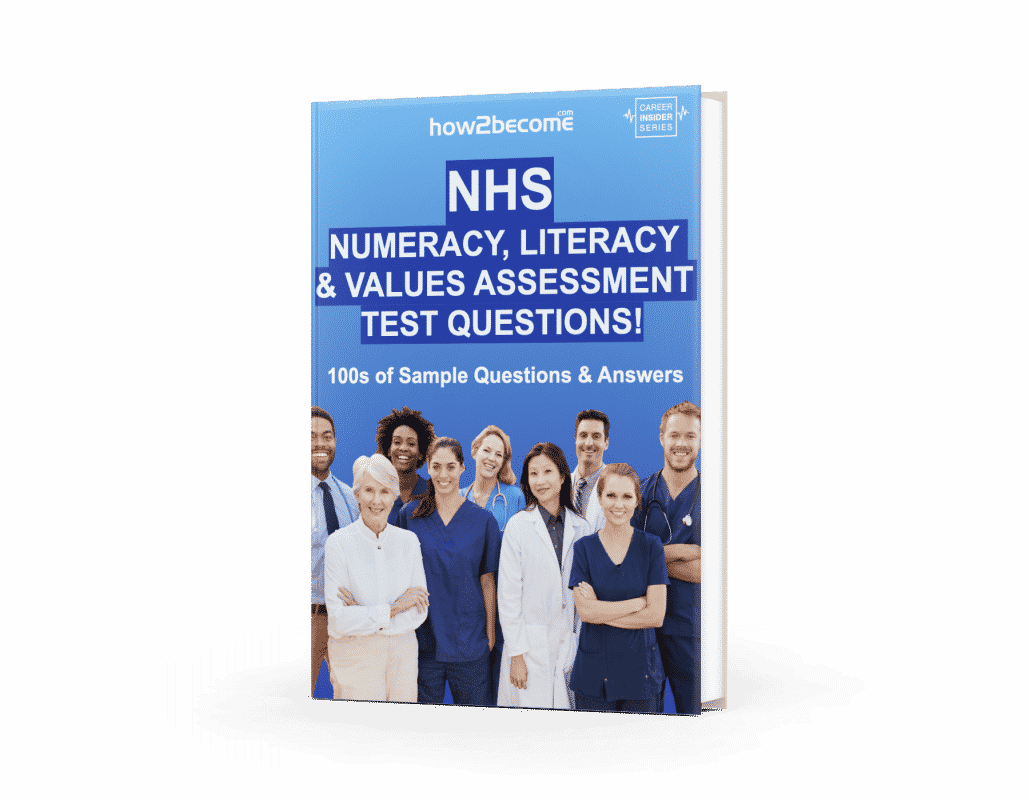
300+ NHS NUMERACY, LITERACY, & VALUES designed to help you effectively prepare for the NHS Interview and Assessment Centre!
Fully worked solutions/answers to all of the questions to ensure you gain an advantage and pass.
Questions and answers verified by our panel of asssessment experts.
Instant access to your workbook and all of the practice questions from any device via instant download.
One-off payment plus, for a limited time, FREE 30-day trial access to our BESTSELLING online NHS Interview Training Course – the perfect companion for the NHS Selection Process!
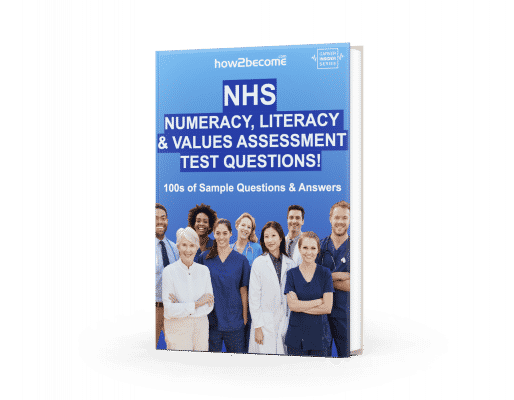
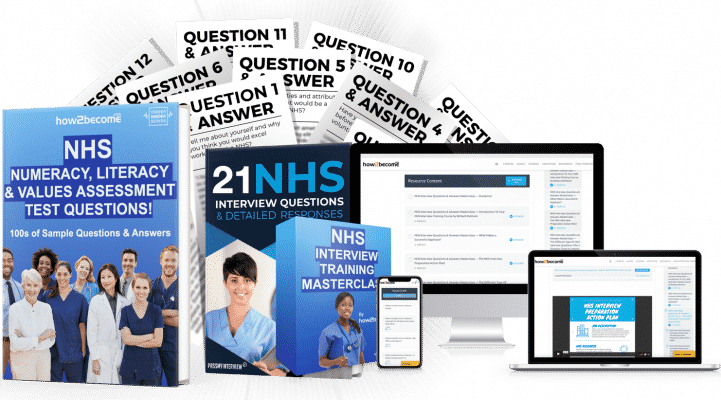
PLUS… BONUSES
In addition to the NHS NUMERACY, LITERACY, & VALUES Questions & Answers, you will also receive the following BONUS:
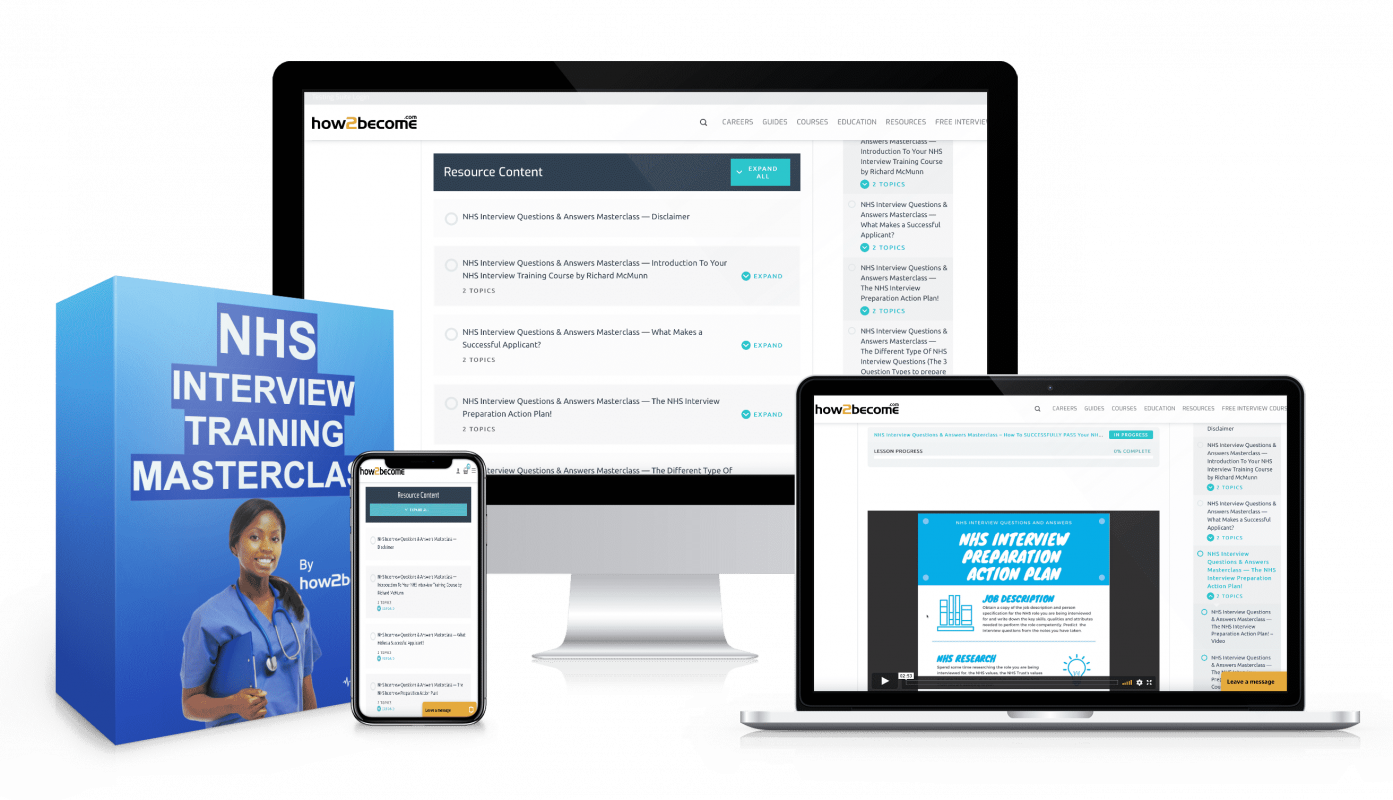
Bonus
ULTIMATE Online NHS Interview Training Course – Order today and you’ll also get a 30-days free access to our bestselling online NHS interview training course designed to boost your scores and success at your interview! This online course has been used by 100s of aspiring NHS candidates to help their successful interview preparation.
*We want you to know: This is a subscription service that is charged at just £27+vat per month after the 30-day trial expires. No minimum term. If you cancel before the 30-day trial ends, you will not be charged. Please see our terms for full details. If you purchase the NHC CAREER BOOSTER PLATINUM PACK, this service is FREE with life-time access, no subscription required.

We have eliminated all risk for you. All of our products and training resources are protected by our 30-day no questions asked money-back guarantee. Whatever the reason…or no reason at all…you can have a full refund if this resource isn’t right for you. So there is no risk.
Who has created the questions and answers to the test questions?
Richard McMunn is a former Fire Officer turned psychometric assessment coach who has over 20 years experience within the recruitment industry.
He is extremely passionate about helping people pass their assessments, and his success rate is unrivalled within the assessment training sector.
Richard guarantees the answers contained within this resource are unique and will help you pass your assessment.

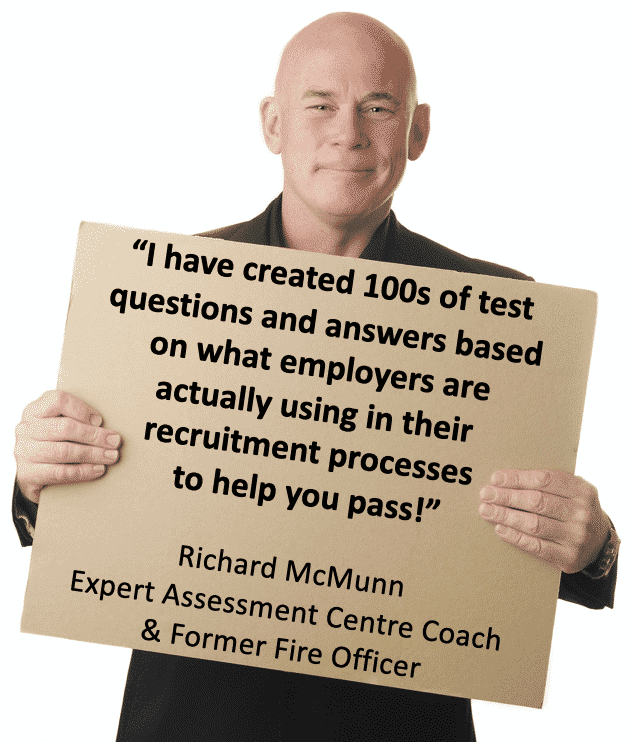
Still not convinced? Here’s why you should buy with How2Become.com…
Firstly, these practice questions and answers are created by us and our team of experts – we have all the most commonly used (and less common) practice questions industry assessors are using and we will help you succeed (like we’ve been doing for the last 17 years) and we update our material frequently.
Secondly, we provide exclusive bonuses with all our products that you won’t find anywhere else. These bonuses include free guides, powerful online training and more!
Thirdly, our testing preparation packages and training just work. Take a look at our customer reviews and feedback where our customers share their positive buying experiences and more importantly the time-saving success our resources have given them (hint: they passed their job assessments).
Finally, we have eliminated all risk for you. All of our products and resources are protected by our 30-day no questions asked money-back guarantee. Whatever the reason…or no reason at all…you can have a full refund if this training isn’t right for you. So there is no risk.
Having helped 100,000s of candidates over the past 17 years, it is no wonder our community loves us…